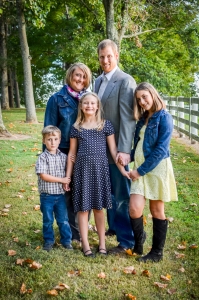Lately, I’ve seen a lot of posts directed at Christian parents that go something like this:
The Church gets 40 hours/year, the Schools get 2,000 hours/year, Parents get 3,000 hours/year – It’s YOUR job to disciple your children.
 There is definitely truth in that statement. The hours listed aren’t far off from what research shows us. The influence that parents/caregivers have on their children cannot be understated and the home is primarily the place of faith formation for all of us. But I’m afraid when this is our approach to beginning the discussion with parents/caregivers about their responsibility of leading discipleship in the home, we do both the parents and kids, but more importantly, the body of Christ a huge disservice.
There is definitely truth in that statement. The hours listed aren’t far off from what research shows us. The influence that parents/caregivers have on their children cannot be understated and the home is primarily the place of faith formation for all of us. But I’m afraid when this is our approach to beginning the discussion with parents/caregivers about their responsibility of leading discipleship in the home, we do both the parents and kids, but more importantly, the body of Christ a huge disservice.
Let me explain.
There is one verse that we often use to demonstrate the mandate in Scripture for parents/caregivers to disciple their kids: Deuteronomy 6:7 – Impress these commandments on your children. Talk about them when you sit at home and when you walk along the road, when you lie down and when you get up. I love this verse because it shows the most everyday, most ordinary moments and tells us in those very ordinary times to talk about our extraordinary God.
But I fear that in shining the spotlight so often on this verse and directing our focus of discipleship exclusively to parents/caregivers, we miss something of great importance, something that changes everything about the command.
This command wasn’t given to parents.
It was given to the community of faith.
The charge to talk about these commandments, to impress them on the children, to disciple the next generation in faith what given to the entire gathered assembly and never once were parents singled out and told that discipleship was their responsibility. On the contrary, the command was clearly given in the presence of everyone (Hear, O Israel) and deemed by God through Moses as applicable to the whole assembly. So much so, it is repeated, nearly word for word in Deuteronomy 11:18-20 again in an address to the whole congregation.
So what does this mean?
Parents, it is not exclusively “your” job to disciple your children.
Church, it IS corporately our job to disciple our children.
So, yes, if you are a parent and you are a believer, of course, it is your job to disciple your kids, especially since you have the most time with them and the most influence on them!
But, Church, please hear this, parents are not supposed to be doing this alone. This isn’t a command devoid of community. This isn’t a mandate that applies only to parents/caregivers and their children. This is a command given to all of us, every single member of the community of faith, to all of our children, not just those who live in our house.
When viewed in this light, some of our common excuses fail.
We can’t say, “I gave my time serving with in Sunday School and youth group when my kids were young. It’s their turn now.”
We can’t say, “Well, they aren’t my kids. It’s not up to me to talk to them about God.”
We can’t say, “It’s not my responsibility.”
I mean, we can say those things, but if we do, we are willfully choosing to ignore the commands that God gave, not to parents alone, but to all of us to pour into, engage with, impress upon, and walk with the youngest generations.
I truly believe it is time for us to release some of the burden we’ve put on the backs of parents by repeatedly telling them, “This is your job” by changing just one letter and a whole way of understanding and instead saying, “This is OUR job.”
No parent should ever feel alone in this calling. Not in the dynamic the God has given us.
They should feel the support, nurture and equipping of an entire faith community surrounding them and ministering to them and their children.
The children in our church should be known (by name) not just by their parents and a few close friends, but the congregation, the community of faith, who are committed to helping them grow in their faith.
The covenant of the congregation, spoken often at baptism or confirmation, in which the congregation pledges to walking with the child and helping them grow in their faith needs to become more than just “what we say” and turn into “what we do.”
The ministries to children and youth in any church should not be lacking in volunteers or servants on mission because the entire church is called and has verbally confirmed their commitment to disciple these young people in the faith.
To place the responsibility squarely on parents without recognizing the responsibility of the church to walk hand-in-hand with them skews the command of God to “impress these commandments on your children.”
Church, it is time we step up and relinquish our excuses. It is time we read the Scripture as it was given; to the whole assembly in community as a unit. It is time we seek to not only support and equip parents but to join them, hand-in-hand, and be part of the work of discipleship.
For more information about
- Kids in Worship
- Determining which Type of Family Ministry model works best for your church
- Encouraging the continued conversation through Practical Discipleship at Home
- Seminars, Workshops, Coaching
Check out to ReFocus Ministry or “like” our Facebook page. Join our conversation at theReFocus Family and Intergen Ministry group on Facebook.
About the author
 Christina Embree is wife to Pastor Luke, mom to three wonderful kids, and family minister at Nicholasville UMC. She is passionate about seeing churches partnering with families to encourage faith formation at home and equipping parents to disciple their kids in the faith. Currently studying Family, Youth and Children’s Ministry at Wesley Seminary, she also blogs at www.refocusministry.org and is a contributing blogger at D6 Family, Seedbed, and ChildrensMinistryBlog.com.
Christina Embree is wife to Pastor Luke, mom to three wonderful kids, and family minister at Nicholasville UMC. She is passionate about seeing churches partnering with families to encourage faith formation at home and equipping parents to disciple their kids in the faith. Currently studying Family, Youth and Children’s Ministry at Wesley Seminary, she also blogs at www.refocusministry.org and is a contributing blogger at D6 Family, Seedbed, and ChildrensMinistryBlog.com.



0 Comments
Melanie
I completely agree with the overall thrust of your post. God does expect parents and the community of believers to disciple children. And it is unfotunate that many within the church “do their time” while their own children are young and then opt out when their children no longer participate in those ministry activities.
But each child is placed in a specific family by God for a specific purpose and parents cannot ever shift the responsiblity to disciple their child onto the larger community. The command was given within the context of community but each family is also responsible specifically for its application. The commands for Passover were both communal and individual-as are most commands in Scripture.
I have seen far too many parents remain slack in their own spiritual lives and assume that the “church” will provide sufficient teaching and example.
The fruit is shown in Judges 2:10 “After that whole generation had been gathered to their ancestors, another generation grew up who knew neither the LORD nor what he had done for Israel.” NIV
Christina Embree
Absolutely, this was not intended to say parents have no responsibility and as the article points out repeatedly, parents/caregivers have the most influence, the home is the most formational place for faith, and parents/caregivers are called like all other believers specifically to the work of discipleship. However, to repeatedly tell parents that discipleship is their job without also acknowledging it is the job of the entire faith community can make them feel segregated, alone, and unsupported.
I think it is also important to note that church isn’t a building or a program; this command was given to a community. Relationships trump programming, but too often I see that our faith communities are unable to offer that type of relationship and community to parents/caregivers either because of being busy, being apathetic, or just not understanding the deep need for it. As with most things in ministry, this needs to be a both/and instead of an either/or
Melanie
True!
Gen Springer
I agree with the thesis of this article. The church/faith community should take major responsibility for discipling kids. However, the scripture used to support it was not used logically. It’s obvious Moses was speaking to parents. He said “when you sit at home…and when you lie down and get up.” (Children would lie down and get up, that is sleep, at home.) And of course Moses spoke to the entire community when instructing parents. He could hardly have gone to individual parents and given instruction. He was acting much like any preacher who might preach on parenting, marriage, etc. He gives instruction to be applied individually to the entire faith community. So, thanks for affirming the church’s responsibility. But I think Moses’ words were mainly for parents.
Christina Embree
It is important to realize the cultural context into which Moses was speaking. The community was truly that, a community. So it was realized by all that it was the responsibility of the entire community to raise the next generation. In the “home” would be included not just kids and their parents, but grandparents, extended family, even servants. All who were in the home were commanded these things specifically but the whole community given the challenge corporately. It is hard to impose on this Scripture the cultural context of America, and that was not my heart, but I did hope to challenge those of us in church who think the responsibility to disciple children lies solely on the shoulders of the parents or trained ministers to realize that simply is not the case. WE, collectively, are called. It is a burden, responsibility, and joy we should all share.
Dan
I think the interpretation is valid. I am Korean American and coming from a culture that is totally communally oriented (almost to a fault, you must mask your individuality for the sake of the whole), I witness this all the time. I was in Korea a couple of months ago and my wife and I decided to stop and eat at a street food stand. An older couple served us. We got to talking and I told them that it was our honeymoon. Even though we had just met, she started to teach me how to be a good husband and etc like my mom or grandmother would do. My Americanness say that is totally a violation of boundaries but my Korean side says that is completely normal. This is not an isolated incident. Living in such a individualistic culture makes it hard for us to understand the nuances of a communal society and sadly what it means to be the church together. We have people in the same church who struggle to pay rent while others boast about their new HD TV or new hot tub….but I digress…
Dee C
Good article but afraid parents would look at the title and feel they are “off the hook”. As a ministry leader I’ve needed to step back from leading to ” walking with” the family. One parent shared, ” I take my child to a doctor, he treats the child but I’m never asked to help. I take my child to soccer practice but the coach never trains me to help my child at home. I take my child to music lessons but never shown what is being taught so I can help at home”. So many times our parents feel inadequate because the “expert” has never shown them how to partner with them in helping their children at home. We have parents thrilled to be the ones leading their kids in partnership with the church. But I have seen many more that would rather have the “experts” take care of the spiritual development of their kids and they will pay for it (i.e.-tithes and offerings). Then if there’s an issue with the child it’s the church that failed, not the parent. There definitely needs to be a great balance but I also know that without the Holy Spirit as teacher than even parent/”expert” can fail.
Christina Embree
I have written many blogs that say exactly that and I completely agree that there is a tendency for some to feel like the experts at church should be the ones to disciple kids. But honestly I am finding more and more parents who have heard the message, know their call to disciple, and are engaging in that work while feeling utterly alone, ill-equipped, and thoroughly exhausted. The result? They give up and either just drop the kids off or withdraw completely because they just can’t do it. I hope that parents won’t just read the title and move on; I doubt many will. But I truly hope that the larger community of faith takes time to consider, am I doing this? Am I still engaged with the youngest generations even though mine are grown.? Am I serving the parents and families of my church? Am I developing relationships where these types of conversations take place? The church isn’t pastoral staff, or the experts; church is by and large, lay people who together are the body of Christ. And they, we, are all called to disciple the children.
Keevin
While I get the gist of what you are trying to relay here, there are some things that are misleading, and at least one thing that is not accurate. I would want anyone who reads your article to catch the spirit of the message but also would hope they don’t get confused by the enlarged (and misleading) lines you have chosen to display.
The message from God to Moses WAS given to the community but was more importantly given to parents. I agree that parents need the community as support, but with limited influence. After all, community is NOT laying down with my kids…or they better not try that. LOL
The 2nd misleading thing someone may take would be that it is not parents’ job to discipline. YES, you reveal the details in the details (just seems like the car dealer – read it really fast – bulk of information).
With all that said, the point of the article is received…because I read the entire article. If I had not, I may have passed this off and discredited the info. I just hope others don’t see the highlights only and misunderstand the message.
Christina Embree
I truly hope that is true as well. I will definitely review what I have chosen to highlight. Thank you for sharing